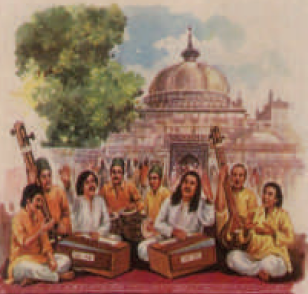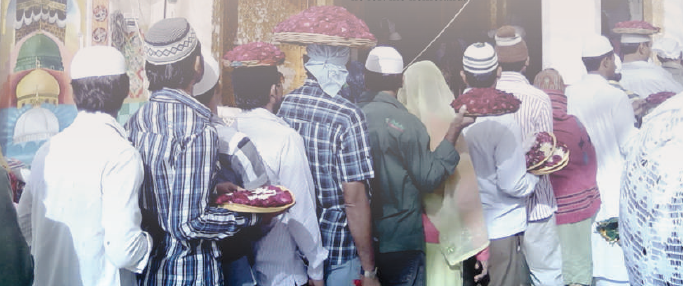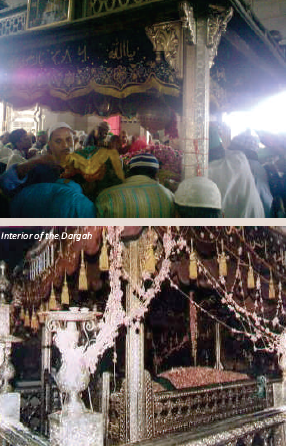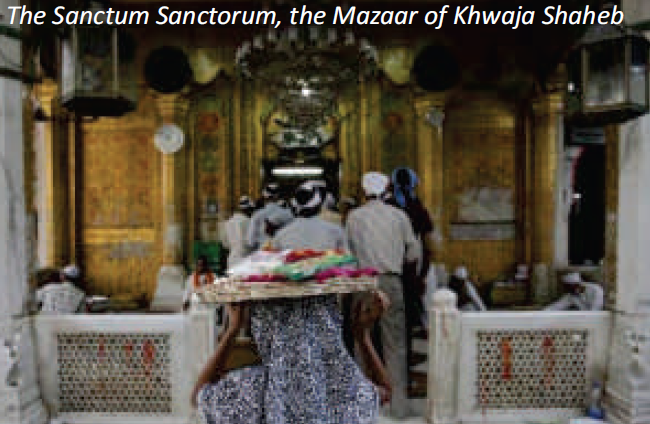Khwaja Moinuddin Chishti
(Created page with "{| class="wikitable" |- |colspan="0"|<div style="font-size:100%"> This is a collection of articles archived for the excellence of their content.<br/>You can help by converting...") |
(→Khwaja Moinuddin Chishti) |
||
| Line 15: | Line 15: | ||
=Khwaja Moinuddin Chishti= | =Khwaja Moinuddin Chishti= | ||
| + | |||
| + | ==Spiritual architect of India's composite culture== | ||
''' Spiritual architect of India's composite culture ''' | ''' Spiritual architect of India's composite culture ''' | ||
| Line 241: | Line 243: | ||
glorious even today. Their message of love is | glorious even today. Their message of love is | ||
potent force even today. | potent force even today. | ||
| + | |||
| + | [[Category:History|K | ||
| + | KHWAJA MOINUDDIN CHISHTI]] | ||
| + | [[Category:India|K | ||
| + | KHWAJA MOINUDDIN CHISHTI]] | ||
| + | [[Category:Name|ALPHABET | ||
| + | KHWAJA MOINUDDIN CHISHTI]] | ||
Latest revision as of 23:00, 2 December 2024
This is a collection of articles archived for the excellence of their content. Readers will be able to edit existing articles and post new articles directly |
[edit] Khwaja Moinuddin Chishti
[edit] Spiritual architect of India's composite culture
Spiritual architect of India's composite culture
India Harmony VOLUME - 1 : ISSUE - 3 APRIL, 2012
Hazrat Khwaja Moinuddin Chishti Ajmeri is a rare persona, a glittering gem in India's crown, who, popularized the message of love and affection through out the country. He heralded Islam's message of peace to the people and laid the foundation of the Ganga-jamni tehzeeb. This philosophy of a syncretic culture highlights the singular fact that civilisational, religious and linguistic barriers can be broken down and people could mesh and live together harmoniously.
Khwaja Ajmeri hailed from Sanjar or Sij, a town in the province of Sajistan in Iran. Born on April 18, 1143 A.D, he was orphaned at the age of thirteen and inherited an orchard and a stone cutting mill. But, the Khwaja was destined to be a spiritual guide and mentor for millions across the world. And his guiding star was a revered soul Ibrahim, who wandered into the orchard and was pleased with the exquisite humility with which, the young Moinudding Chisti served him. He blessed the young man and shared a piece of cake with him. And after he had eaten the piece of cake, the young Moinuddin Chisthi was a transformed person. He sparkled with the divine grace of Allah and was no longer enamoured with his earthly possessions. Tending to his orchard or the stone cutting unit held no charm for him. Renouncing the worldly possessions and fixing his heart and soul firmly in the Divine, he left his homeland.
As he reached Samarkhand, the spiritual yearning increased and he learnt the Quran completely and imbibed all spiritual knowledge.
Seeking to further his knowledge, he headed towards Harwan in search of a perfect murshid (mentor) and met Sheikh Usman Harwani. After he had completed two and a half years under the tutelage of his murshid, the duo embarked on and toured the Arab world for well over a decade. visiting the Holy cities of Mecca and Medina. During this sojourn, the Khwaja heard a Divine voice hailing him and declaring: 'He is our friend, we accepted him and made him a pious person'. And the Divine pronouncement has reverberated over the centuries and across continents, making the Khwaja, one of the holiest and most divine persona, sought after by millions cross the world.
When he was 52, the Khwaja, bid adieu to his mentor and proceeded to Baghdad. After reaching Sanjar, he lived in the company of Sheikh Najmuddeen Kubraa and he went into a retreat for forty days of intense penance in Baghdad. He also spent sometime with Sheikh Shahabuddin, the founder of Silsilah Sahrwardiyyah. From Baghdad, he went to Hamdaan, then to Tabrez, where he lived with Sheikh Jalaaluddeen Tabrezi. With the blessings of his mentors, he headed to India, touring through different regions and cities. At first, he halted at Lahore and practised intense austerities for forty days at the shrine of Sheikh Ali Hajweri. He then proceeded to Multan.
The Khwaja acquired felicity in various languages spoken in India and began his mission of spreading the message of peace and amity amongst the people. . He moved to Delhi for a time and later to Ajmer, where he settled down permanently.
While, there was some opposition to his stay from the King of Ajmer, the Khwaja's piety and his spiritual evolvement, slowly erased the animus. The wandering Fakir prevailed over the King.
At Ajmer, Khwaja Saheb devoted himself to serving humanity and continued to propagate the message of peace. His court knew no discrimination between the rich and poor, a Raja or a mendicant. He behaved evenhandedly with everyone and people belonging to different religions and nations were welcomed in his office without any discrimination. The less privileged, who lived sans any identity or access to wealth and power, For the less privileged, who had no identity of their own and did not have any access to the powerful, it was the Khwaja saheb's court that proved a lifeline. Earlier, when the Khwaja Sahjeb had parted with his mentor, the latter advised him that having decided to renounce all worldly riches, he should live like a fakir, a wandering mendicant, whose sole aim should be to help those who are the poorest. He had further asked him to show immense forebearance in the face of all trials and tribulations and single-mindedly devote himself to the cause of the underprivileged, serving them with immense love and affection.
And the Khwaja Saheb followed his mentor's advice and served the poor and the hapless with complete devotion, unmindful of all hurdles. Even oppression by the monarch, could not deter him from his resolute stand and his courage and steadfastness proved unshakeable even in the face of every hardship.
And in the true spirit that exemplifies everything about India, he showered affection upon the masses irrespective of creed and caste. And his precept of serving the most under-pirvileged sections, redressing their grievances and showing immense humanity, proved to be a hallmark of selfless service.
By founding a permanent chain of Sufi succession, his mureeds (disciples) spread his message across the country.
He founded the Chistiyya Silisilah and trained people with spiritual calling, in the task of serving humanity. While, these messengers of the Seer spread his message, several of them compiled his teachings and also wrote about the man, who was their mentor. Some of this literature is available as 1) Aneesul Arwaah, (2) Risaalah dar Kasb-e- Nafas, and (3) Daleelul 'Aarifeen. These books enunciate Khwaja Saheb's vision and instruct his followers to embrace sulook (good behaviour).
He preached that Tasawwuf is neither a science nor a custom; rather it is morality that is perfect in all respects. The excellence of a saalik (follower of these teachings) is that he embodies all types of virtues, his life mirrors Shari'ah and his character is one that practices lofty values and he is a supporter of the poor, mentor of the have-nots and a well-wisher and companion of the weak and powerless.
The Khwaja remarked that it is necessary for the friends of Tareeqat (the blessed path) to meet the following conditions in different stages of sulook (self realization) and these include (1) Search for truth, (2) Search for perfect murshid (mentor), (3) Etiquette, (4) Obedience, (5) Love, (6) Repudiation of materialism, (7) Piety, (8) Stability, (9) Austerity simple food and minimum sleep, and (10) Solitude.
Similarly, it is necessary that when one follows the path of “sulook” (spiritual enlightenment) carry out the following ten tasks: (1) Kindness to all, (2) eschew denigration of any person, (3) adopt humility, (4) selfless love for humanity, (5) discard hatred, (6) acceptance of each task and surrender to the will of Allah, (7) patience and forbearance in each affliction, (8) contentment, (9) Faith in Allah, and (10) burning and melting one's own heart.
Through these teachings Khwaja provided a complete training to his adherents. His towering personality and teachings have spread a new light across India. His followers include Khwaja Qutbuddeen Bakhtiyaar Kaakee (of Delhi), Baabaa Fareeduddeen Ganj-e-Shakar (of Punjab), Sheikh Nizaamuddeen Awliyaa' of Delhi), Hazrat Saabir Kaliyari, Poet musician Ameer Khusro, Chiraagh-e-Dehli Khwaja Naseeruddeen and founder of Urdu prose Khwaja Bandah Nawaaz Gaisoo Daraaz. These illustrious followers turned the light of spirituality towards seeker.
These eminent people promoted harmony, integration and composite values in the country, and their tradition is alive and glorious even today. Their message of love is potent force even today.




